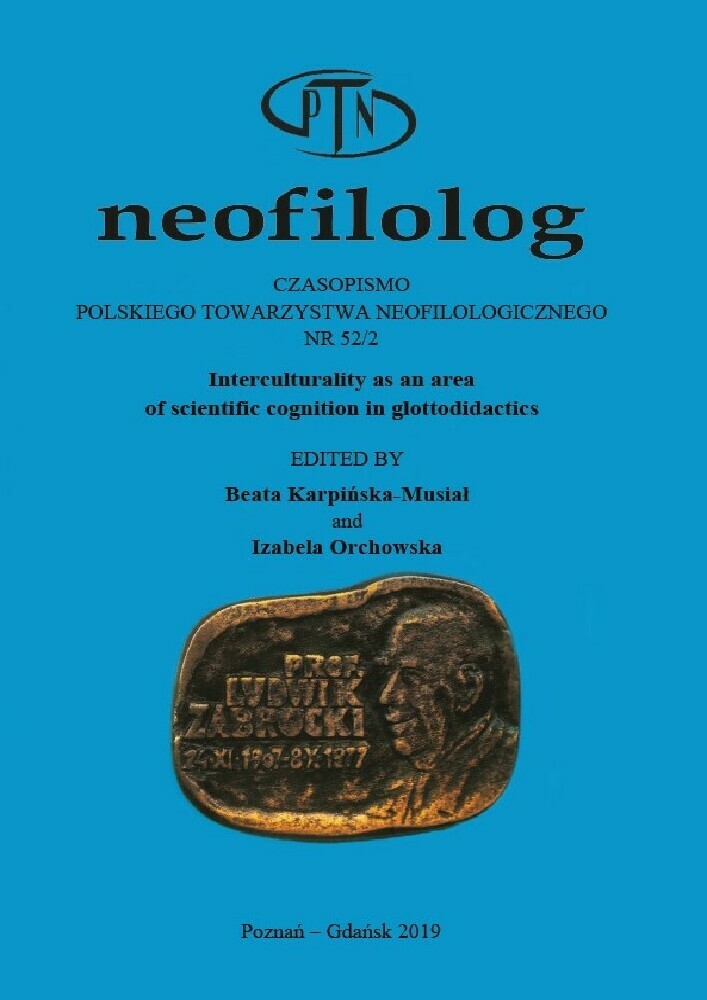Abstract
Second language education (SLE) must remain open to developments in the world if it is to be relevant to those who have an investment in it: learners, teachers and researchers. However, the broadening of the in-terdisciplinary nature of SLE that may occur because of this is not with-out its problems. New areas will bring ideas and terminology that will make SLE as a discipline even more complex. In addition, the ideas and terminology may be disputed in the fields from which they originate thus compounding the problem of complexity. The article looks at the example of the performative in SLE and how it supports an approach that is interdisciplinary and intercultural. It also looks at some of the problems this causes: the implications of implementing an SLE practice that is performative, the fact that there are different performative prac-tices, as well as variance between seemingly similar performative prac-tices because of national and cultural differences. The article concludes with the description of two studies which show the complex nature of performative SLE as praxis.Literaturhinweise
Bańczerowski J. (1975), Is Metaglottodidactics Necessary? (in) “Glottodidactica”, No. 8, pp. 21-26.
Blaszk M. (2016), An inquiry into happening in school education: some of the questions it poses to teaching English as a foreign language in schools (in) Stanulewicz D., Janczukowicz K., Rocławska-Daniluk M. (eds.), Language education: controversies, observations and proposals. Frankfurt am Main: Peter Lang, pp. 199-214.
Blaszk M. (2017), Happening in Education – Theoretical Issues. Frankfurt am Main: Peter Lang.
Council of Europe (2001), Common European Framework of Reference for Lan-guages: Learning, teaching, assessment. Cambridge: Cambridge University Press.
Crutchfield J., Schewe M. (2017), Introduction: Going Performative in Intercul-tural Education. International Contexts, Theoretical Perspectives and Models of Practice (in) Crutchfield J., Schewe M. (eds.), Going Performa-tive in Intercultural Education. International Contexts, Theoretical Per-spectives and Models of Practice.Bristol: Multilingual Matters, pp. xi-xxv.
Dakowska M. (2014), O rozwoju dydaktyki języków obcych jako dyscypliny naukowej. Warszawa: Wydawnictwo Uniwersytetu Warszawskiego.
Domańska E. (2007), „Zwrot performatywny” we współczesnej humanistyce (in) “Teksty Drugie”, No. 5, pp. 48-61.
Geertz C. (1973), The Interpretation of Cultures. New York: Basic Books.
Goffman E. (1959), The Presentation of Self in Everyday Life. New York: Anchor Books.
Frimberger K. (2017), The Ethics of Performative Approaches in Intercultural Education (in) Crutchfield J., Schewe M. (eds.), Going Performative in Intercultural Education. International Contexts, Theoretical Perspec-tives and Models of Practice. Bristol: Multilingual Matters, pp.21-40.
Garoian C.R. (1999), Performing Pedagogy: Toward an Art of Politics. Albany: State University of New York Press.
Karpińska-Musiał B. (2015), Międzykulturowość w glottodydaktyce. Gdańsk: Wydawnictwo Uniwersytetu Gdańskiego.
Kirby M. (1966), Happenings: An Illustrated Anthology. New York: E.P. Dutton & Co., Inc.
Królica, M. (2006), Drama i happening w edukacji przedszkolnej. Kraków: Oficyna Wydawnicza Impuls.
Layzell R. (1993), Live Art In Schools. London: The Arts Council of Great Britain.
Maley A., Duff A. (1987), Drama Techniques in Language Learning: A Resource Book of Communication Activities for Language Teachers. Cambridge: Cambridge University Press.
Morawski S. (1971), Happening (2). Rodowód – charakter – funkcje (in) “Dialog”, No. 10, pp. 117-144.
Pawłowski T. (1982), Happening. Warszawa: Wiedza Powszechna.
Rintoul D. (2011), Drama workshops attended by the author. Between Festival, 19-21 May. Sopot, TeatrWybrzeże – ScenaKameralna.
Schechner R. (1982), The End of Humanism: Writings on Performance. New York: Performing Arts Journal Publications.
Sobkowiak P. (2015), Interkulturowość w edukacji językowej. Pożnan: Wydawnictwo Naukowe UAM.
Turner V. (1957), Schism and Continuity in African Society: A Study of Ndembu Village Life. Manchester: Manchester University Press.
Wilczyńska W., Michońska-Stadnik A. (2010), Metodologia badań w glottodydaktyce. Wprowadzenie. Kraków: Avalon.
Lizenz
Copyright (c) 2019 Neofilolog

Dieses Werk steht unter der Lizenz Creative Commons Namensnennung - Keine Bearbeitungen 4.0 International.
Autoren:
Die Autoren der zur Veröffentlichung in der Zeitschrift Neofilolog angenommenen Texte sind verpflichtet, den Vertrag über die Erteilung einer kostenlosen Lizenz für die Werke mit der Verpflichtung zur Erteilung einer Sublizenz CC auszufüllen, zu unterzeichnen und an die Adresse der Redaktion zurückzusenden.
Gemäß Vertrag erteilen die Autoren auf die in der Zeitschrift Neofilolog veröffentlichten Texte der Adam-Mickiewicz-Universität in Poznań eine nicht exklusive und kostenlose Lizenz und erlauben die Verwendung der Sublizenz Creative Commons Attribution-NoDerivatives 4.0 International (CC BY-ND 4.0).
Die Autoren behalten das Recht zur weiteren freien Verfügung über das Werk.
Benutzer:
Interessierte Onlinebenutzer dürfen die seit 2017 veröffentlichten Werke unter folgenden Bedingungen nutzen:
- Anerkennung der Urheberschaft - die Verpflichtung, zusammen mit dem verbreiteten Werk Informationen über die Urheberschaft, den Titel, die Quelle (Links zum Originalwerk, DOI) und die Lizenz selbst bereitzustellen;
- ohne Schaffung abgeleiteter Werke - das Werk muss in seiner ursprünglichen Form erhalten bleiben, ohne Zustimmung des Autors dürfen keine Studien, beispielsweise Übersetzungen, verbreitet werden.
Die Urheberrechte aller veröffentlichen Texte sind vorbehalten.
Sonstige:
Die Adam-Mickiewicz-Universität in Poznań behält das Recht auf die Zeitschrift als Gesamtheit (Layout, Grafik, Titel, Umschlagsprojekt, Logo usw.).

